
If you want to grow your brand, you need a content marketing plan. Why?
Seventy-eight percent of companies that produce effective content have a documented marketing strategy.
That said, there’s no use in creating content if it won’t help you achieve your marketing goals. Instead, you need to know how to recognize great content.
To help ensure your brand doesn’t fade into the background, let me walk you through eight great content marketing examples you can learn from.
What Is Content Marketing?
Content marketing is content created and shared for a specific commercial purpose, such as gaining website traffic, increasing brand awareness, or influencing people to buy your products.
A recent survey taken by professional content marketers found the following:
- 88 percent of content marketers say content marketing is effective for branding.
- 88 percent of marketers say content marketing is effective at building brand trust.
- 80 percent said content marketing works to educate audiences.
- 72 percent said content marketing is effective for lead generation.
The survey respondents said other effective uses of content marketing are driving audiences to events, building loyalty with existing customers, supporting the launch of a new product, and building subscriber lists.
“Content” has a wide definition, including podcasts, eBooks, infographics, and blog articles. Essentially, if it’s a form of media designed to acquire and influence an audience.
How do you know what makes “great” content? One of the best ways to learn content marketing is by looking at real content marketing strategy examples.
My step-by-step guide breaks down content marketing in detail.
8 Content Marketing Examples
While these content marketing examples are all unique, they have something in common: a clear purpose.
Bear that in mind as you read through these examples and you’ll better appreciate how to create successful content.
Without further ado, here’s a look at some amazing content marketing strategy examples.
1. MoonPie: Brand Voice
Content marketing is all about standing out from the crowd. One way to do this is by developing a memorable brand voice.
Why does voice matter?
According to Sprout Social’s research, 33 percent of customers say a distinct personality helps a company stand out on social media, and 46 percent appreciate brands who engage their audiences, so developing your voice is worth a shot.
MoonPie’s Twitter feed is a great example of a content marketing strategy. Not only does every Tweet have a clear purpose, but the brand uses a consistently fun tone to encourage engagement:
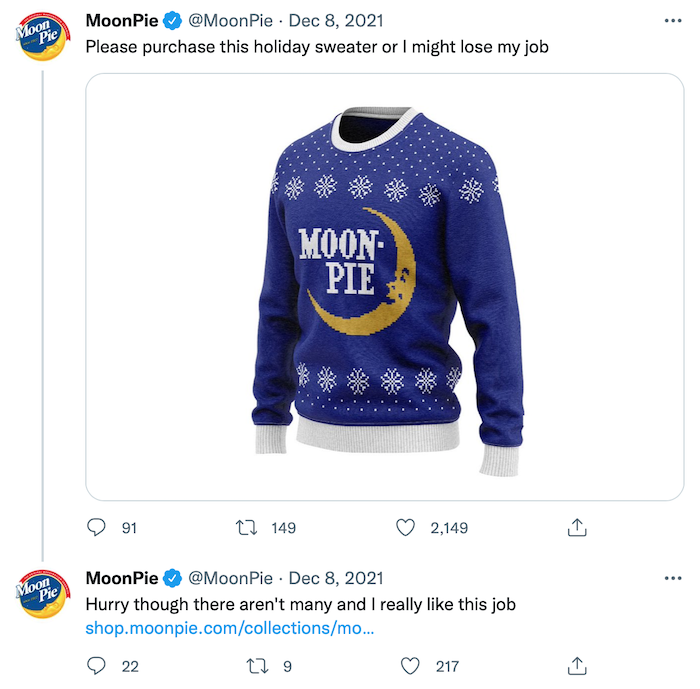
Here’s another example. Rather than just posting a product link, the social media manager appeals to followers with a quirky tone:
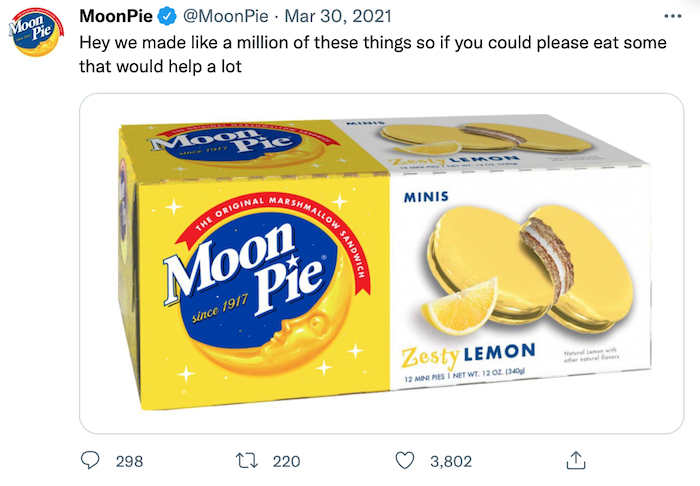
What’s the lesson here? Refine your brand voice. Here’s how.
- Revisit your company’s mission. Your voice should align with your company’s values, so make sure you’re clear on what your business stands for.
- Research your target demographic. What is your audience looking for? What do they care about? Use your answers to refine your voice.
- Take a look at your most successful content. Figure out what works and replicate this. For example, if your most successful content focuses on, say, your company’s eco-friendliness, create more content emphasizing this value.
2. Gymshark: Video Ad Campaign
Another way to stand out from your competitors is by making video content: 81 percent of marketers believe videos help them increase sales. Let’s break down a great content marketing example from Gymshark.
Gymshark wanted to promote a key message: fitness unites everyone. To do so, they ran the “United We Sweat” campaign, promoting inclusivity, diversity, and overcoming obstacles. They also designed promotional images to accompany the campaign:

The content works because it showcases the brand’s core message: uniting people through fitness. The slogan “United We Sweat” is simple and memorable, too, which helps.
How do you learn from this example? First, think about what makes your brand special. Revisit your mission statement and target market if you need a refresher.
Then, consider your campaign goals. Gymshark wanted to move away from its association with super-fit athletes and instead show why it’s a universal fitness brand. Placing “united” and “sweat” together makes sense.
Finally, keep it simple. When it comes to slogans and taglines, less is usually more.
Need some more inspiration? I walk you through how to write business slogans elsewhere.
3. Nadaré Co: Viral Content
Viral content instantly boosts your visibility, spreads your brand message, and generates more traffic, so it’s a worthwhile goal.
Let me use content marketing examples from Nadaré Co, a jewelry company, as an example of a successful content marketing strategy in action.
Nadaré Co’s founder began posting TikTok marketing content to promote the brand’s unique waterproof jewelry. She now has over 91,000 followers, over 1.3 million TikTok “likes,” and videos watched by thousands of people daily!
The secret to achieving this example of a content marketing strategy?
Post useful, highly targeted videos designed to entertain viewers, answer questions, and solve problems. For example, here’s a video on how to find your ring size, so customers know exactly which ring size will fit them before they order:
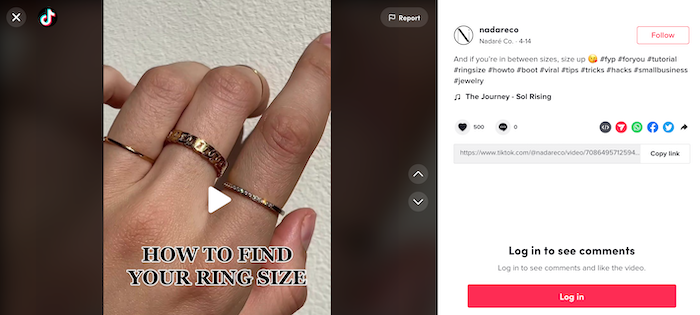
There’s also a video advertising the jewelry’s waterproof features and worldwide shipping:
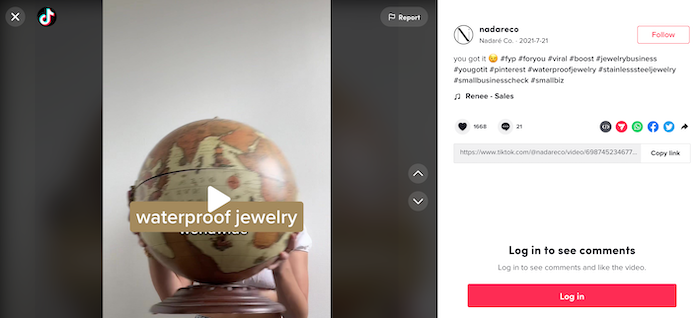
Here’s what we can take away from this content marketing strategy example.
- Keep your videos short and engaging.
- Highlight what makes your brand special in every video.
- Use relevant hashtags to improve your content’s visibility and reach.
4. Ridester: Long-form Content
To educate your audience, you need long-form posts in your content marketing strategy.
Research shows that in-depth posts typically outrank shorter, less comprehensive blogs, and the average first-page search result on Google has over 1,400 words.
In other words, long-form content is worth your time and Ridester has some great content marketing examples.
After losing a significant amount of traffic, Ridester prioritized writing long-form content to answer the questions readers care about.
In one blog post, for example, Ridester sets out actionable steps for making more money as an Uber Eats driver. There’s no fluff; it’s comprehensive but concise:
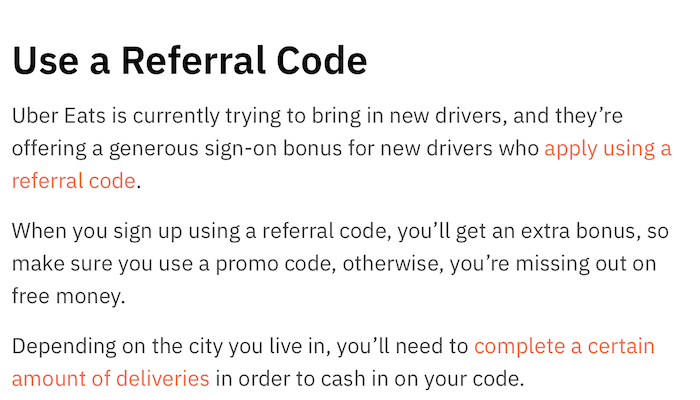
After revamping its long-form content, Ridester saw a 487 percent organic traffic increase and improved its search rankings for 16 search phrases. Cool, right? Here’s how you can emulate this success.
- First, use search tools like Quora and Reddit to discover what matters to your audience and what questions they’re asking.
- Next, try out Ubersuggest to find the right keywords to target in your content.
- Do some competitor research. Where are the content gaps? What questions have they failed to answer? Use the answers to these questions to complete your research.
5. Cricut: Influencer Marketing
Depending on your audience, influencer marketing is a highly effective strategy. Cricut, a DIY crafts supplier, illustrates why.
Cricut teamed up with “New Girl” actress Zooey Deschanel to promote its products. Deschanel, a real-life crafts enthusiast, brings authenticity and fun to Cricut’s content:
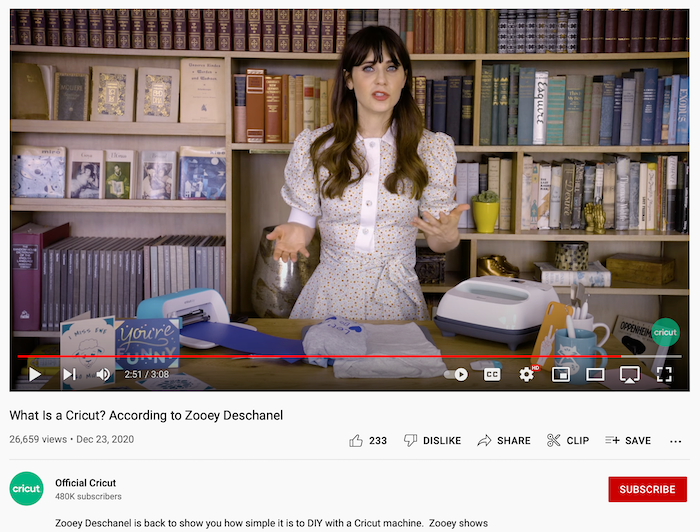
As we saw with Nadaré Co, videos are a great way to bring your product to life and build audience trust in your brand. Now, here are some tips for using influencers effectively in any content marketing strategy.
- Define what you need help with and determine how an influencer can help you achieve it.
- Make sure your influencer aligns with your brand. For example, Deschanel works great for Cricut because she’s a real-life crafts enthusiast.
- To maximize engagement, choose campaign-specific hashtags for the influencer to use to promote your products.
You can find influencers through social media keyword searches and influencer marketplaces.
6. Storiarts: User-generated Content
User-generated content (UGC) is proof your products work. You’re not paying a marketing team to write ads or promote an item. Instead, you’re letting your products speak for themselves through satisfied customers. That’s why consumers are 2.4 times more likely to say UGC is more authentic than branded content.
Storiarts does this well. Storiarts turned to Instagram with two goals in mind:
- Driving sales of its literary-themed products.
- Highlighting the brand’s commitment to ending illiteracy.
Users can post pictures of themselves enjoying Storiarts products on a dedicated hashtag, #committolit:
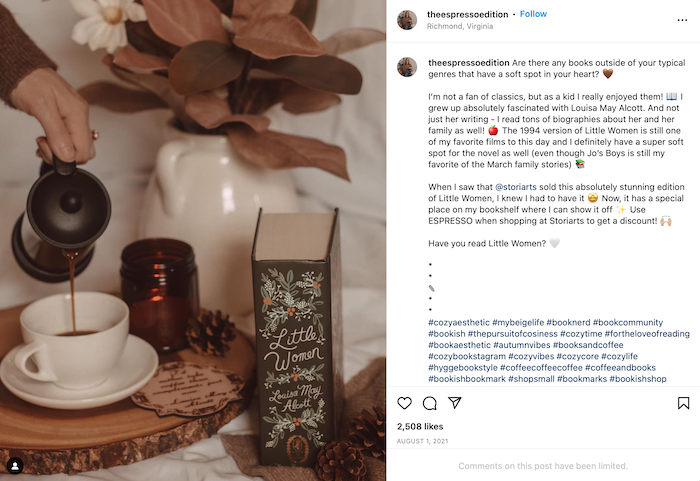
How did this campaign work out for Storiarts?
They’ve grown from an obscure Etsy store, into a recognizable brand with over 82,000 followers and counting.
Want to best take advantage of UGC? Here’s how.
- Create a dedicated hashtag on social media. Keep it short and memorable.
- Engage with customers who post on the hashtag to encourage participation.
- Choose a campaign that promotes your brand’s mission to boost your company’s profile.
Got a goal like ending illiteracy? Tell the world about it!
7. Fire & Ice: Product Videos
Want to showcase what’s so great about your products? Successful content marketing examples often come down to high-quality product videos.
When you create videos as a content marketing strategy, you aren’t alone. In fact, 69 percent of marketers increased their video budget for 2022 per the results of a recent Content Marketing Institute survey.
Videos show your products in action and, ideally, they should answer questions your target audience might have about your services.
Fire & Ice made a video explaining how their air conditioner repair service works.
In just a few minutes, the video sets out what customers can expect from their service and how much it costs. Most importantly, it includes a clear CTA (how customers can book an appointment.)
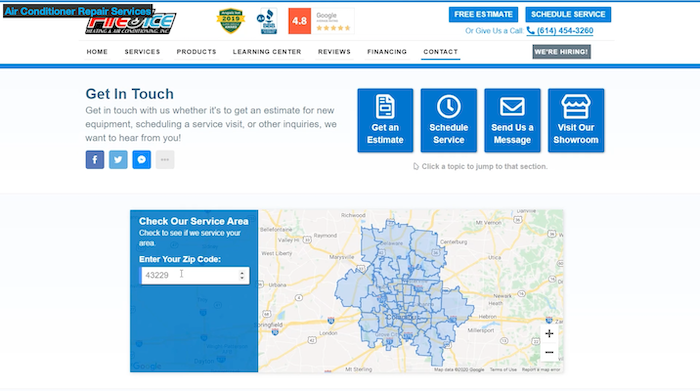
Here are some actionable takeaways from this example of a content marketing strategy:
- Do some market research to learn what your customers want.
- Consider repurposing existing content into video form.
- Break your videos into sections so viewers can jump to the most relevant part for their query.
- Always end with a clear CTA and include your contact details somewhere obvious.
8. Vienna Beef: Web Content
For our last content marketing strategy example, we’re talking about first impressions.
Why? Because first impressions matter.
In fact, 94 percent of consumers decide whether to browse a website based on its look and feel. In other words, when prospects land on your website, you want to set the right impression.
Vienna Beef, a Chicago-style hot dog manufacturer, knows this. After partnering with a digital marketing agency for a website redesign, they:
- tripled their website traffic
- reduced shopping cart abandonments
- increased sales
Here’s the homepage. It’s optimized for sales without being pushy. It’s also vibrant and engaging, with clear links to product pages:
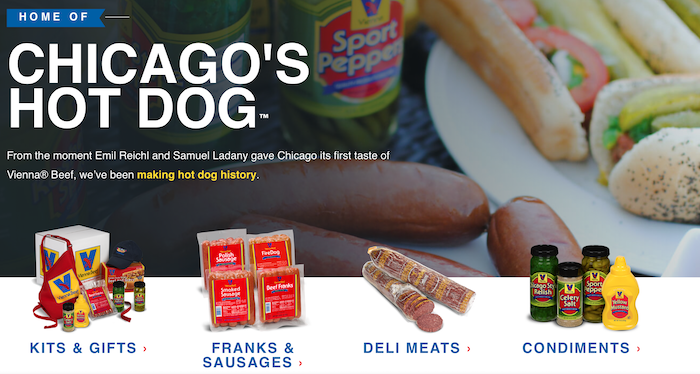
Scroll down and you’ll find links to hot dog stands and local stockists:
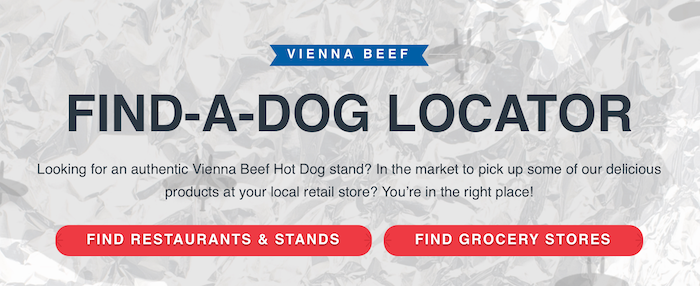
It’s easy to overlook website design when you think of content marketing, but actually, web copy and design are among your most important content.
My suggestion? Set clear goals. Vienna Beef knew exactly what they wanted from their redesign which is how they achieved it so successfully.
Then, hire a website designer. Effective website design is an art, and if you’re serious about content marketing and conversion, it’s worth the investment.
Finally, run some A/B testing to check which design elements work best. You might find my A/B testing guide helpful.
Content Marketing Examples: Frequently Asked Questions
What is content marketing?
Content marketing involves creating useful and engaging content across all mediums to organically grow your business, boost your visibility, and increase sales.
How can you recognize a good example of content marketing?
Whether it’s an informative blog post or an eye-catching graphic, all good content serves a purpose. It tells a story and reinforces a company’s brand identity. Great content marketing allows a brand to connect with its audience, so look for authenticity, professionalism, and strong messaging with a clear CTA or desired result.
How can you recognize an example of poor content marketing?
Again, it’s fairly easy to spot. Simply look for muddled messaging, unnatural or “keyword stuffed” writing, and content that lacks any clear CTA or purpose. Poorly-timed marketing campaigns which are insensitive to current news always fall short, too.
How can I best learn from examples of content marketing strategies I come across?
Be intuitive. Explore what you think works (or doesn’t work) and why. If you’re impressed by a content marketing example, consider how you can apply the principles such as engaging visual elements and strong brand messaging to your marketing efforts.
Conclusion: Content Marketing Examples
If you’re serious about growing your business and getting some brand exposure, then you need a content marketing strategy.
Research successful examples, take what works, and identify how you can implement those techniques in your content.
Don’t forget to track your key metrics, too, so you can see what’s working…and fix what’s not.
Struggling to produce the right content for your goals? Check out my consulting services and discover how I can steer you in the right direction.
Have you found any other great content marketing examples? What did you learn from them?



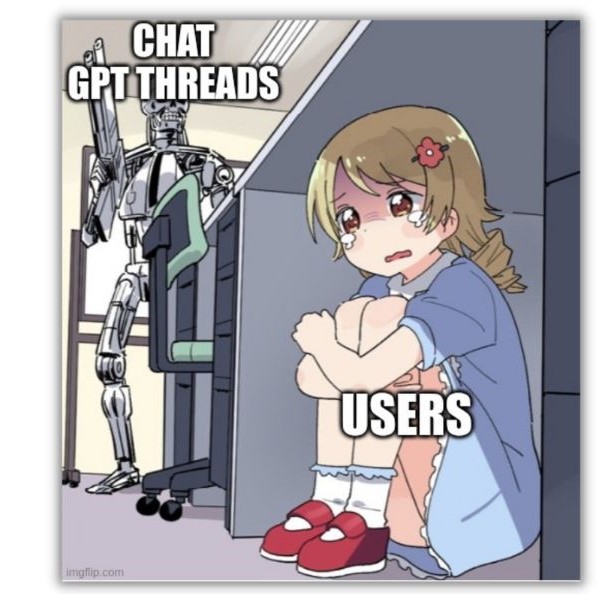

Recent Comments